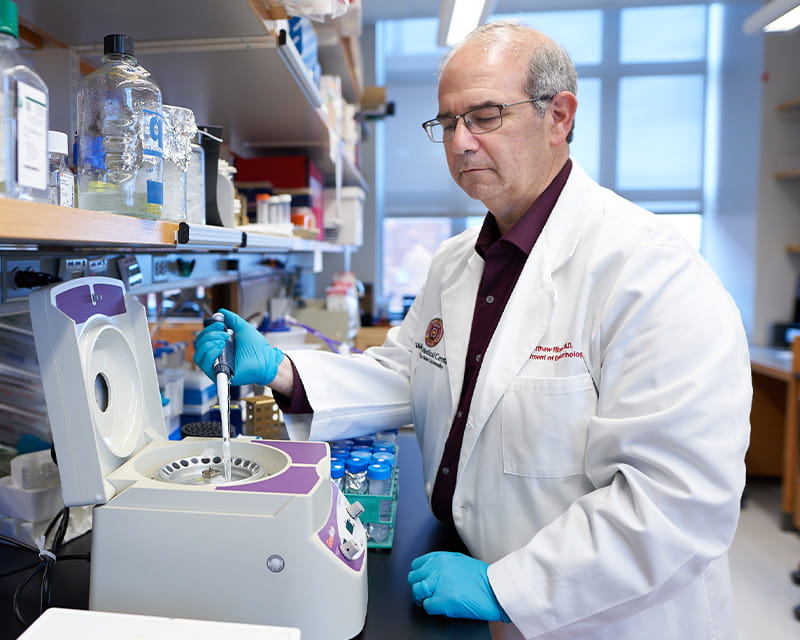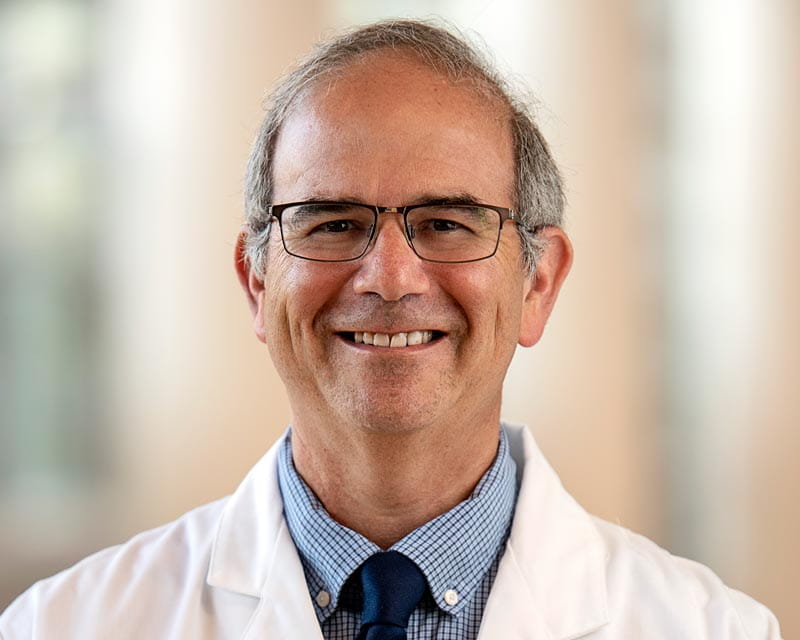
Studying “brake failure” in thyroid cancer metastasis
 Matthew Ringel, MD, receives Sidney H. Ingbar Distinguished Lectureship Award
Matthew Ringel, MD, receives Sidney H. Ingbar Distinguished Lectureship AwardFor Matthew Ringel, MD, the great passion of his professional life is unraveling how and why thyroid cancer develops and how it impacts patient health.
Ringel serves as chair of the Department of Molecular Medicine and Therapeutics at The Ohio State University, where he is also the Ralph W. Kurtz Professor of Medicine, co-leader of the Cancer Biology Program, co-director of the Center for Cancer Engineering and deputy director of Ohio State’s Clinical and Translational Science Institute (CTSI).
In the research lab, Ringel’s goal is to better understand aggressive thyroid cancers, use this knowledge to design new therapies and offer patients better clinical care. His research spans the past 24 years, the last 18 years at The Ohio State University Comprehensive Cancer Center – Arthur G. James Cancer Hospital and Richard J. Solove Research Institute.
For his innovative and visionary leadership and research in thyroid cancer, Ringel now holds the Sidney H. Ingbar Distinguished Lectureship Award.
The American Thyroid Association conferred the award on Ringel in September 2021 at the association’s annual meeting, held virtually. Ringel was recognized for making major academic contributions to thyroid-related research in keeping with the innovation and vision that epitomized the career of Sidney Ingbar. Ingbar, an endocrinology specialist and expert on the physiology of the thyroid gland and associated diseases, taught at Harvard Medical School and authored hundreds of scientific articles.
“This award demonstrates the quality and impact of our research and clinical care at The Ohio State University,” Ringel says. “But we’re a team here. We have a large group that does thyroid work. This award is highly related to the great people I’ve had in my lab, unbelievable collaborators and colleagues in the clinic and throughout the university, plus wonderful family support.”
Ringel’s research focuses on the tumorigenesis and metastasis of thyroid cancer. The American Thyroid Association noted that Ringel’s work in cell signaling has impacted the development of novel therapeutic approaches for thyroid cancer.
Ringel and his colleagues have identified a potentially important pathway – p21-activated kinase (or PAK) – downstream of the BRAF gene that may be involved in the progression of papillary thyroid cancer. Their work is funded by a National Institutes of Health grant, with the goal to:
During the award selection process, Ringel gave a lecture titled, “P21-Activated Kinases, A New Player in BRAF-Mediated PTC Carcinogenesis and Progression.” It highlighted this part of the work of his research group.
“We focus on identifying biomarkers and pathways that lead to aggressive thyroid cancer behavior. We look at mechanisms of late-stage cancer progression and mechanisms of therapeutic resistance to existing treatments,” Ringel says. “The whole focus is to come up with better treatments for patients with progressive thyroid cancers that don’t respond to standard therapies.”
The Ringel Lab at Ohio State has worked to understand cancer biology, thyroid cancer, endocrine cancer invasion and metastasis. Ringel and his research team focus on basic and translational science, new drug testing for thyroid cancer treatment, signaling research and finding novel therapies.
Ringel believes that collaboration is key to discovering new, better ways to treat patients with thyroid cancer.
“We’ve worked with research collaborators at Ohio State and other centers around the country,” Ringel says. “We’ve contributed to work that has helped improve our understanding of thyroid cancer, which has also served as a basis for new therapies for the disease.”
While Ringel never had the opportunity to collaborate with the late Ingbar, he enjoys an academic connection to the award’s namesake.
“I did not know Dr. Ingbar. But I’m kind of an academic grandchild because two of my mentors trained in his lab. It’s a nice connection,” Ringel says.
And Ringel thanks those mentors for their support as well.
“I’ve had fantastic mentors throughout my training and also as a young faculty member here at The Ohio State University,” Ringel says. “And that’s important – a great team and great role models.”